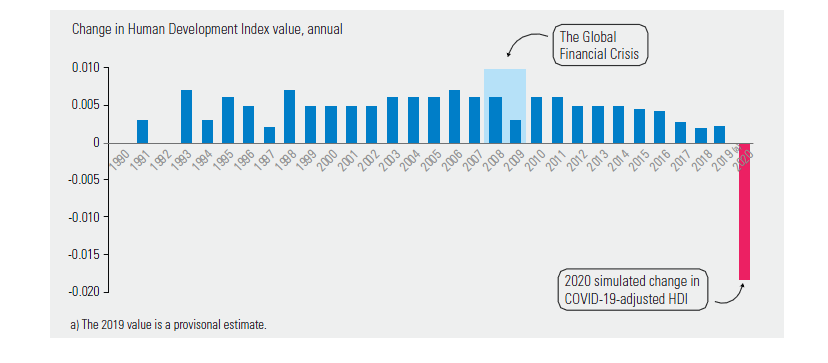George Monbiot is only one of many commentators who have argued the need for a post-pandemic programme of economic reconstruction that will address environmental concerns as well as the imperative of restoring and securing the livelihoods of literally hundreds of millions of people. The importance of this latter imperative cannot be overstated. In the US alone, unemployment by the end of April quadrupled to 14.7 percent, with 20.5 million jobs lost. In the UK, the Bank of England has warned of a doubling of unemployment to nine percent and a shrinkage of the economy’s overall output to a 300-year low. The UK unemployment figures are less horrific than they otherwise would be because of a massive debt-financed programme of wage and salary compensation that the Chancellor of the Exchequer has correctly characterised as unsustainable.
Against this background, Monbiot (and I am not picking on him here; he is rather the most articulate and best informed proponent of this perspective, and therefore the most difficult target) argues that ‘[g]overnments should provide financial support to company workers while refashioning the economy to provide new jobs’ outside the automobile, fossil fuel and airline industries. It is now a commonplace that after the financial crisis of 2008, governments bailed out many of the financial institutions that had caused the crisis – that is, their shareholders, managers and workers – rather than those who bore the worst consequences. Monbiot argues that: ‘This is our second great chance to do things differently’. But with government debt and expenditure levels relative to GDP already approaching twentieth-century wartime levels, just to finance short-term remediation, the unavoidable question is: do things differently with what? And where will the investment necessary for such new jobs, and the financing needed to support workers’ transition to them, come from?
It is nice to envision, as a team of luminaries including Nobel laureate economist Joseph Stiglitz and climate economics authority Sir Nicholas Stern has recently argued based on an expert survey, that post-pandemic reconstruction can contribute to reducing climate impacts through investment in ‘clean physical infrastructure, building efficiency retrofits, investment in education and training, natural capital investment, and clean R&D’, whatever that is. The authors do not explain where the money will come from, in a world where the estimated US$2.5 trillion annual investment needed to meet the Sustainable Development Goals before the pandemic was nowhere in sight.
It is possible, in theory, to envision mobilising the needed resources by way of income and wealth tax rates that were prevalent after the Second World War, responding to wartime government debt and expenditure levels. Many of these are now probably infeasible because of the concentration of ultra-wealth in financial instruments and tax haven real estate, and because of possibilities for capital flight that can best be limited through transnational cooperation in a world where a corporate-financed US Congressional candidate has claimed that ‘[f]reedom and democracy are best secured when banking secrecy and tax havens exist’.
If the ultra-rich are probably beyond the reach of national public policy, then the menu of policy options shrinks considerably. When many dividends have already been cancelled, whose income does Monbiot propose to reduce, whose assets to tax or seize, and how? What happens to firms that cancel dividend payouts when investors flee their shares, making it impossible for them to raise new capital in response to lockdown-created shortfalls? How can green jobs be created by seizing foreign oligarchs’ London property holdings, their financial assets having long ago been safely shifted elsewhere? How many of the Russell Group universities’ 508 senior staff who were paid more than the prime minister in 2018-19 will agree to salary cuts or marginal tax rate increases for the greater good? Will their response be representative of their broader posh demographic? Will clinicians who own second homes be content with strongly progressive taxation of their increased value over the years? What are the legalities of much-needed retrospective wealth taxation?
In short: How are these dreams to be paid for?
These are not rhetorical questions, and they should be the starting point for conversations that substitute serious consideration of political economy for cheerleading. Even in high-income countries, the post-pandemic menu of policy options is likely to be circumscribed by the International Monetary Fund’s role as a gatekeeper to financial markets – a role that low- and middle-income countries (LMICs) have experienced with often bitter consequences over the past decades, with the impacts compounded by capital flight. Given the dire situation of LMICs, what justification can the high-income world offer to the world’s majority outside its borders for not taking advantage of fossil fuel prices that have sunk to the pre-1973 levels that enabled today’s rich to get that way, unless its development assistance agencies and investors are willing to increase their commitments by at least an order of magnitude? Such conversations may have begun, but I am not hearing them.

